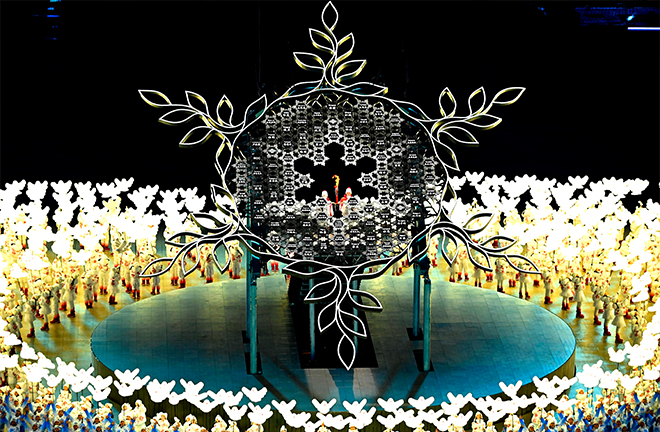Sports and music: harmony between body and mind

Beijing 2022 Olympic Winter Games, the torch is placed in the middle of the giant snowflake, which ascended to the top of the stadium. Photo: Mao Jianjun/CNS
The Olympic Games, which began in ancient Greece, represent the largest and most influential sports event in the world. It shows the charm of sports and the international spirit. In 1924, the Winter Olympics was officially formed. The 24th Olympic Winter Games, namely the Beijing 2022 Olympic Winter Games, has realized its goal of attracting 300 million Chinese people to participate in ice and snow sports.
Many of the Winter Olympics’ theme songs bring us to the scene of the games. Each resounding note makes us feel the “quiet beauty” of the Chinese land and the country’s joy of hosting the games. We feel the warm atmosphere of the arena—this is the charm of music, and also the charm of sports. Sports and music develop alongside each other. They work together to convey the common value of human civilizations through shaping both the body and the mind.
Sports and music complementary
Chinese modern sports started with gymnastics (military gymnastics) and music lessons were taught to promote its development. Music is widely accepted by the public in a relatively simple form, and its educational function has a profound and long-lasting impact on individuals. As the most popular method for education in political life, songs are not as boring as didactic political preaching. They edify people’s thoughts and political views in a more interesting and diverse way.
The combination of gymnastics and songs shape people from both the inside and the outside. Gymnastics makes the physique strong, it is external; Music eases emotions, which are internal.
Liang Qichao, the foremost leader who helped usher the Wu Hsu Reform (also called the Hundred Days of Reform), which attempted to renovate China’s national and social system, featured a saying in the Children’s Education Chapter of the Proposals for Wu Hsu Reform, “Children must learn music to have fun and smooth the flow of their blood and qi; children must learn gymnastics for physical fitness so that each of them have a soldier’s physique.”
Since the first World War, the idea of making sports educational became popular and the concept of “new sports” emerged, which inspired the creation of songs about sport activities. The “Football Song” created by Shen Xingong is considered the earliest football-themed song recorded in Chinese history. During this period, Chinese songs such as “Sports Song” and “Cheer Song” and foreign songs such as “Locomotive,” “Fight Is On,” “We Have Won Again,” and other sports songs were born. On the one hand, sports provide material and inspiration for song creations. On the other hand, songs interpret the charm and vitality of sports as cultural symbols of sportsmanship. The two complement each other with perfect synergy.
Olympic theme songs
Since the 1984 Los Angeles Olympic Games, each Olympic Games has had its own theme song, which became an important symbol for the games. For example, “Oceania,” the theme song for 2004 Athens Olympic Games, expresses the ideas of tolerance and integration. The theme song of the opening ceremony of the 2008 Beijing Olympic Games, “You and Me”, embodies the harmonious concept of “One World, One Dream.” These songs either extol the glory of mankind, or express the organizers’ welcome to people from all countries, or cheer up athletes.
“Light The Fire Within,” the theme song of the 2002 Salt Lake City Winter Olympic Games, “Because We Believe,” the theme song of 2006 Torino Olympic Winter Games, “I Believe,” the theme song of the 2010 Vancouver Olympic Winter games, all convey people’s love for peace and foster the unity and solidarity of people around the world.
At the opening ceremony of the Beijing 2022 Olympic Winter Games on Feb 4, 138 children sang the theme song “Snowflake”, demonstrating the idea we are all “together for a shared future.” In the synonymous publicity song, elements of the skiing, skating, sleigh, curling, and the Olympic emblem, mascot, and other Winter Olympic elements are integrated, which generates stories of the Winter Olympics that are lively with the flavor of life. It shows the Chinese spirit of pursuing unity and progress and the cultural values of “harmony without uniformity.”
Kang Huifang is from the School of Marxism at Shanghai Maritime University.
Edited by BAI LE

 PRINT
PRINT CLOSE
CLOSE